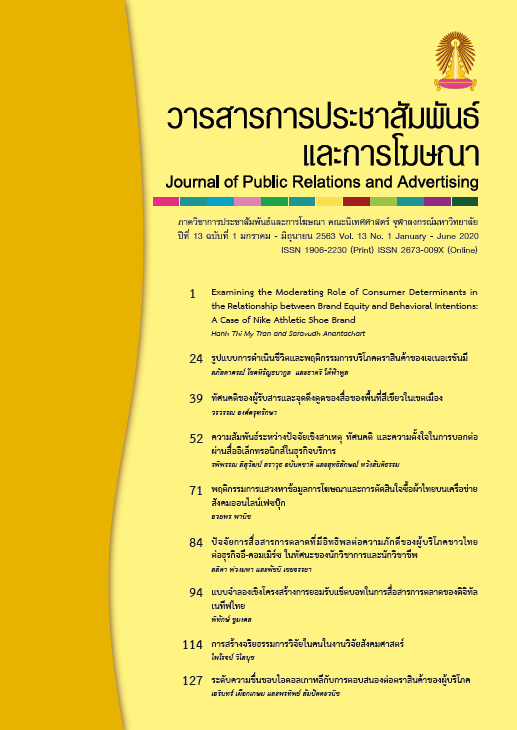The Building of Human Research Ethics in Social Science Research
Main Article Content
Abstract
This article aims to illustrate 2 issues - first, the stages of building of human research ethics, and second, the ability of research participants to help the researcher in building human research ethics. In the latter, this article showed that apart from the researcher, the research participants could also make the ethics possible. Two cases from research on personal selling were discussed. Research participants built the human research ethics by explaining the research project and related details to key informants. In addition, they helped the researcher ask other research participants to sign their names on the consent forms as written evidences. These showed that the research project was reliable because it was conducted based on the substantial process of building human research ethics. All the research participants understood the research project. They were not coerced to participate in the research project. This results in both the researcher and the offices who support research funds in terms of safety.
Article Details
References
คณะกรรมการวิจัยแห่งชาติ, สำนักงาน. (2555). จรรยาวิชาชีพวิจัยและแนวทางปฏิบัติ. พิมพ์ครั้งที่ 2. กทม.:สำนักงานคณะกรรมการวิจัยแห่งชาติ.
คณะกรรมการวิจัยแห่งชาติ, สำนักงาน. (2559). แนวทางจริยธรรมการทำวิจัยที่เกี่ยวข้องกับมนุษย์. ฉบับปรับปรุง. ครั้งที่ 1. พิมพ์ครั้งที่ 5. กรุงเทพฯ: สำนักงานคณะกรรมการวิจัยแห่งชาติ.
จรรยา เลิศอรรฆยมณี. (2552). “หลักจริยธรรมการวิจัยในคนและคณะกรรมการจริยธรรมการวิจัยในคนของคนศิริราช.” เวชบันทึกศิริราช จริยธรรมในทางการแพทย์และวิจัย. 2 (1) 2-6.
ชไมพร กาญจนกิจสกุล. (2555). ระเบียบวิธีวิจัยสังคมศาสตร์. ตาก: โพรเจ็คท์ ไฟฟ์-โฟว์.
ไพโรจน์ วิไลนุช. (2561). การสื่อสารระหว่างพนักงานขายและลูกค้าในบริบทธุรกิจเครื่องสำอาง. รายงานการวิจัย. กรุงเทพฯ: มหาวิทยาลัยหอการค้าไทย.
ไพโรจน์ วิไลนุช. (2561ก). วิธีวิทยาการวิเคราะห์การสนทนา: วิธีวิทยาการวิจัยการสื่อสาร. กรุงเทพฯ: สำนักพิมพ์แห่งจุฬาลงกรณ์มหาวิทยาลัย.
ภาษาอังกฤษ
Andreescu, L. (2013). “Self-Plagiarism in Academic Publishing: The Anatomy of a Misnomer.” Science and Engineering Ethics, 19 (3), 775-797.
Arumugam, A. and Aldhafiri, F.K. (2016). “A Researcher’s Ethical Dilemma: Is Self-Plagiarism a Condemnable Practice or Not?.” Physiotherapy Theory and Practice, 32 (6), 427-429.
Berlin, L. (2009). Plagiarism, Salami Slicing, and Lobachevsky. Skeletal Radiology, 38, 1-4.
Callahan, J.L. (2018). “The Retrospective (im) Moralization of Self-Plagiarism: Power Interests in the Social Construction of New Norms for Publishing.” Organization, 25 (3), 305-319.
Canadian Institutes of Health Research, Natural Sciences and Engineering Research Council of Canada, and Social Sciences and Humanities Research Council of Canada. (2014). Tri-Council Policy Statement: Ethical Conduct for Research Involving Humans. Interagency Secretariat on Research Ethics: Ottawa, Canada. Retrieved November 15, 2019, from http://www.providenceresearch.ca/sites/default/files/documents/TCPS_2_2014.pdf
Clarke, R. (2006). “Plagiarism by Academics: More Complex Than It Seems.” Journal of the Association for Information Systems, 7 (2), 91-121.
European Commission. (2010). European Textbook on Ethics in Research. Brussels: European Commission.
Farquhar, J. D. (2012). Case Study Research for Business. London: Sage.
Jefferson, G. (2004). “Glossary of Transcript Symbols with an Introduction.” In Gene H. Lerner (ed.) Conversation Analysis: Studies from the First Generation, pp. 13-31. Amsterdam: John Benjamins Publishing.
Gray, B. et al., (2017). “Are Research Ethics Guidelines Culturally Competent?.” Research Ethics, 3 (1), 23-41.
Kara, H. and Pickering, L. (2017). “New Directions in Qualitative Research Ethics.” International Journal of Social Research Methodology, 20 (3), 239-241.
Moskovitz, C. (2016). “Self-Plagiarism, Text Recycling, and Science Education.” Bioscience, 66 (1), 5-6.
Sarangi, S. (2015@2019). “Communication Research Ethics and Some Paradoxes in Qualitative Inquiry.” Journal of Applied Linguistics and Professional Practice, 12 (1), 94-121.
The British Psychological Society. (2014). Code of Human Research Ethics. Leicester: The British Psychological Society. Retrieved November 15, 2019, from https://www.bps.org.uk/sites/bps.org.uk/files/Policy/Policy%20%20Files/BPS%20Code%20of%20Human%20Research%20Ethics.pdf
Wilainuch, P. (2006). Communication between Nurses and Patients in HIV/AIDS Counselling. Unpublished Dissertation. England: University of York.


